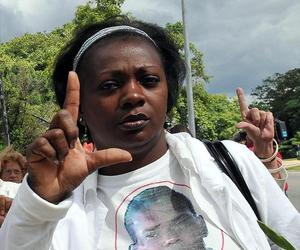Cuba’s Ladies in White chief gets passport, plans Europe trip; 2nd dissident told can’t travel
- Submitted by: lena campos
- Society
- 02 / 08 / 2013

Cuban authorities granted a passport Friday to the leader of a protest group that received the European Union’s top human rights prize in 2005, even as another, lesser-known dissident reported being told she will not be allowed to leave the country.
Berta Soler, the most prominent member of the Ladies in White, picked up her new passport in the morning and said she plans to make a long-delayed trip to Europe to pick up the EU’s Sakharov award, something she has been unable to do until now because she was denied an exit visa.
The 50-year-old exit visa requirement, which was often denied to the likes of doctors, military officers and dissidents, has been abolished under travel reform that took effect Jan. 14.
Soler said she would contact EU officials to schedule a date, and she’s also hoping to visit Spain and attend two April human rights conferences in Panama and Germany.
“I have many invitations to different places,” she told The Associated Press, holding up her new passport.
The Ladies in White formed a decade ago to press for the release of their husbands, 75 dissidents imprisoned in a 2003 crackdown. All 75 have since been freed, and the Ladies have refocused their message on demanding political change, with almost completely new membership. Soler is one of the few original members still active in the group.
Cuban authorities excoriate dissidents as treasonous “mercenaries” who accept foreign money to undermine the island’s communist-run government.
Separately, activist Gisela Delgado, a former member of the Ladies, said she visited a migration office to inquire about her status and was told that “I was restricted from traveling because I belonged to counterrevolutionary groups.”
Delgado already has a passport and has traveled in the past, but last year was denied an exit visa for a trip to the United States.
Several dissidents including blogger Yoani Sanchez and hunger strike protester Guillermo Farinas say they have been told they can travel. Sanchez already has her passport and plans to visit Brazil on Feb. 17. A lesser-known dissident, Eliecer Avila, has already traveled to Sweden.
However others, including Angel Moya, one of the 75 locked up in 2003, have been denied travel papers because they have legal sentences pending.
The new travel law eliminated the exit permit and eased bureaucratic procedures for going abroad, but contains language reserving the state’s right to withhold passports for reasons of national security and public interest.
“Having a passport is no guarantee you can leave the country,” Soler said.
Delgado told the AP she does not have any legal cases pending with the state, and it was unclear why she would be blacklisted while others are allowed to travel.
Source: Washington Post.com
Comments